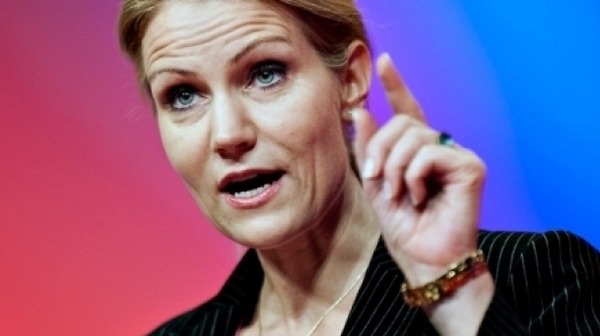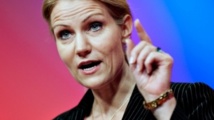Danish Prime Minister Prime Minister Helle Thorning-Schmidt described the assault as "a terrorist attack" as Danish television showed the windows of the Krudttonden cultural centre pock-marked by multiple bullet holes.
Police released a photo of the suspect showing a man in a dark anorak and a maroon hat carrying a black bag.
They described him as 25-30 years old, around 185cm (six feet) tall, with an athletic build.
French ambassador to Denmark Francois Zimeray, who had been present at the debate but was not hurt, told AFP the shooting was an attempt to replicate the January 7 attack against the Charlie Hebdo weekly in Paris, which left 12 people dead.
"They shot from the outside (and) had the same intention as Charlie Hebdo, only they didn't manage to get in," he said by telephone from the venue.
"Intuitively I would say there were at least 50 gunshots, and the police here are saying 200," he told AFP.
"Bullets went through the doors and everyone threw themselves to the floor."
A statement by Danish police said "an unidentified man died after having been hit by bullets" in the strike, and three officers were wounded in the shooting.
Police initially said two suspects had fled the scene in a Volkswagen Polo. The car was found abandoned around two hours after the attack.
After witness statements indicated there was just one attacker, police later said they were hunting for a lone gunman.
Media reports said it was likely the gunman used an automatic rifle to fire as many rounds as possible in a short time.
"Denmark has today been hit by a cynical act of violence. Everything leads us to believe that the shooting was a political attack and therefore a terrorist act," the Danish premier said in a statement.
The assault comes at a time of heightened security and rising fears of Islamist attacks, following January 7-9 incidents in Paris that left 17 people dead.
Anti-terror sweeps carried out across Europe since mid-January have resulted in the arrests of dozens of suspected jihadists and seizures of large stocks of weapons and explosives.
- 'Bullets went through doors' -
Raids in Belgium on January 17 thwarted what police called imminent "terrorist attacks to kill police officers on public roads and in police stations."
Two suspects were killed fighting Belgian police in those sweeps.
Satirical weekly Charlie Hebdo raised the ire of Islamist extremists by publishing cartoons mocking Mohammed and periodically satirising Islam.
Vilks has been living under police protection after his controversial cartoons prompted death threats.
Concern of renewed attacks targeting symbols of freedom of speech and the press have been growing since the Charlie Hebdo assault, Reporters Without Borders secretary-general Christophe Deloire told AFP after the Copenhagen assault.
"It's something that we feared after Charlie Hebdo. We see that ultra-radical groups are leading a war against freedom of expression, against the freedom to be irreverent about religion and against the simple freedom to debate them," Deloire said.
- 'We're all Danish tonight' -
A Charlie Hebdo columnist voiced dismay over the Copenhagen shooting, saying: "We are all Danish tonight".
"It's horrible because it's one month after the Paris attacks, it brings back all the sadness," Patrick Pelloux told AFP.
Pelloux, who arrived at Charlie Hebdo's offices just minutes after the attack by two Islamist gunmen, urged artists not to succumb to self-censorship out of fear. "We must stand firm and not be afraid," he said.
French President Francois Hollande contacted Denmark's Thorning-Schmidt to express his country's "solidarity in this ordeal", according to a presidential statement.
French Foreign Minister Laurent Fabius condemned what he called a "terrorist attack targeting a public meeting", saying in a statement that France "remains by the side of the Danish authorities and people in the fight against terrorism."
The French president's office also said Interior Minister Bernard Cazeneuve would travel to Copenhagen on Sunday.
----------------------------------------------------------------------------------------------------------------------
Police released a photo of the suspect showing a man in a dark anorak and a maroon hat carrying a black bag.
They described him as 25-30 years old, around 185cm (six feet) tall, with an athletic build.
French ambassador to Denmark Francois Zimeray, who had been present at the debate but was not hurt, told AFP the shooting was an attempt to replicate the January 7 attack against the Charlie Hebdo weekly in Paris, which left 12 people dead.
"They shot from the outside (and) had the same intention as Charlie Hebdo, only they didn't manage to get in," he said by telephone from the venue.
"Intuitively I would say there were at least 50 gunshots, and the police here are saying 200," he told AFP.
"Bullets went through the doors and everyone threw themselves to the floor."
A statement by Danish police said "an unidentified man died after having been hit by bullets" in the strike, and three officers were wounded in the shooting.
Police initially said two suspects had fled the scene in a Volkswagen Polo. The car was found abandoned around two hours after the attack.
After witness statements indicated there was just one attacker, police later said they were hunting for a lone gunman.
Media reports said it was likely the gunman used an automatic rifle to fire as many rounds as possible in a short time.
"Denmark has today been hit by a cynical act of violence. Everything leads us to believe that the shooting was a political attack and therefore a terrorist act," the Danish premier said in a statement.
The assault comes at a time of heightened security and rising fears of Islamist attacks, following January 7-9 incidents in Paris that left 17 people dead.
Anti-terror sweeps carried out across Europe since mid-January have resulted in the arrests of dozens of suspected jihadists and seizures of large stocks of weapons and explosives.
- 'Bullets went through doors' -
Raids in Belgium on January 17 thwarted what police called imminent "terrorist attacks to kill police officers on public roads and in police stations."
Two suspects were killed fighting Belgian police in those sweeps.
Satirical weekly Charlie Hebdo raised the ire of Islamist extremists by publishing cartoons mocking Mohammed and periodically satirising Islam.
Vilks has been living under police protection after his controversial cartoons prompted death threats.
Concern of renewed attacks targeting symbols of freedom of speech and the press have been growing since the Charlie Hebdo assault, Reporters Without Borders secretary-general Christophe Deloire told AFP after the Copenhagen assault.
"It's something that we feared after Charlie Hebdo. We see that ultra-radical groups are leading a war against freedom of expression, against the freedom to be irreverent about religion and against the simple freedom to debate them," Deloire said.
- 'We're all Danish tonight' -
A Charlie Hebdo columnist voiced dismay over the Copenhagen shooting, saying: "We are all Danish tonight".
"It's horrible because it's one month after the Paris attacks, it brings back all the sadness," Patrick Pelloux told AFP.
Pelloux, who arrived at Charlie Hebdo's offices just minutes after the attack by two Islamist gunmen, urged artists not to succumb to self-censorship out of fear. "We must stand firm and not be afraid," he said.
French President Francois Hollande contacted Denmark's Thorning-Schmidt to express his country's "solidarity in this ordeal", according to a presidential statement.
French Foreign Minister Laurent Fabius condemned what he called a "terrorist attack targeting a public meeting", saying in a statement that France "remains by the side of the Danish authorities and people in the fight against terrorism."
The French president's office also said Interior Minister Bernard Cazeneuve would travel to Copenhagen on Sunday.
----------------------------------------------------------------------------------------------------------------------









 Home
Home Politics
Politics











